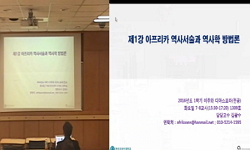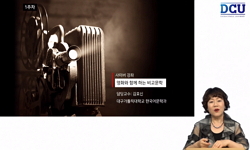This study attempts to re‐conceptualize literature that is closely tied to the empire and nation and examines the possibility of a transnational literature which embodies the fluid life in a glocal cultural environment. Taking the discussions of Edw...
http://chineseinput.net/에서 pinyin(병음)방식으로 중국어를 변환할 수 있습니다.
변환된 중국어를 복사하여 사용하시면 됩니다.
- 中文 을 입력하시려면 zhongwen을 입력하시고 space를누르시면됩니다.
- 北京 을 입력하시려면 beijing을 입력하시고 space를 누르시면 됩니다.

탈경계 주체들과 문화혼종 전략 - 디아스포라 소설을 중심으로 = Trans‐boundary Subjects and Cultural Hybridity Strategies ‐ Centering on Diaspora Novels
한글로보기부가정보
다국어 초록 (Multilingual Abstract)
This study attempts to re‐conceptualize literature that is closely tied to the empire and nation and examines the possibility of a transnational literature which embodies the fluid life in a glocal cultural environment. Taking the discussions of Edward Said and Gayatri Spivak which had specified the strategies of literary imagination within post‐colonial theory as a start, this study tries to specify the hierarchy and strategic significance between the trans‐boundary cultural phenomena and its literary representation. Also, this study examines transnational literary theory as the methodology to ‘read’ and ‘explain’ Korean and European works that reproduce the diaspora which crosses hybrid cultural space.
Reading Le Clezio’s Poisson d'Or (Fish of Gold) and Sukyoung Hwang’s Baridagi together, we examine the process of the third world refugee Laila’s and Bari’s embodying and suturing Europe’s hybrid culture. The reading of W. G. Sebald’s Austerlitz along with Inhoon Choi’s Hwadu, the process of a ‘modern’ intellectual’s gaining insight into the mutually foreign cultures of modern Europe and making a ‘gap’ in it will be examined. In this process, the trans‐immigrant’s identity which actively appropriates the boundary and cultural hybridity existing between the homeland and migrant country will be focused on. Here, the identity as the other and narrative strategy monopolizing hybrid culture which the diaspora characters have will be the standard in understanding their autonomous actions. Also, this study faces the limits of existing literary studies centered on nation‐state discourses and aims to understand Korean literature’s identity as a third world literature in comparison to European literature.
다국어 초록 (Multilingual Abstract)
This study attempts to re‐conceptualize literature that is closely tied to the empire and nation and examines the possibility of a transnational literature which embodies the fluid life in a glocal cultural environment. Taking the discussions of Edw...
This study attempts to re‐conceptualize literature that is closely tied to the empire and nation and examines the possibility of a transnational literature which embodies the fluid life in a glocal cultural environment. Taking the discussions of Edward Said and Gayatri Spivak which had specified the strategies of literary imagination within post‐colonial theory as a start, this study tries to specify the hierarchy and strategic significance between the trans‐boundary cultural phenomena and its literary representation. Also, this study examines transnational literary theory as the methodology to ‘read’ and ‘explain’ Korean and European works that reproduce the diaspora which crosses hybrid cultural space.
Reading Le Clezio’s Poisson d'Or (Fish of Gold) and Sukyoung Hwang’s Baridagi together, we examine the process of the third world refugee Laila’s and Bari’s embodying and suturing Europe’s hybrid culture. The reading of W. G. Sebald’s Austerlitz along with Inhoon Choi’s Hwadu, the process of a ‘modern’ intellectual’s gaining insight into the mutually foreign cultures of modern Europe and making a ‘gap’ in it will be examined. In this process, the trans‐immigrant’s identity which actively appropriates the boundary and cultural hybridity existing between the homeland and migrant country will be focused on. Here, the identity as the other and narrative strategy monopolizing hybrid culture which the diaspora characters have will be the standard in understanding their autonomous actions. Also, this study faces the limits of existing literary studies centered on nation‐state discourses and aims to understand Korean literature’s identity as a third world literature in comparison to European literature.
참고문헌 (Reference)
1 최수철, "「표류, 혹은 근원에의 항해」, 르 클레지오, 황금물고기" 문학동네 2010
2 르 클레지오, "황금물고기" 문학동네 2010
3 송승철, "화두의 유민의식: 해체를 향한 고착과 치열성" (여름) : 1994
4 최인훈, "화두" 민음사 1994
5 네스토르 가르시아 칸클리니, "혼종문화 - 근대성 넘나들기 전략" 그린비 2011
6 김성곤, "하이브리드시대의 문학"
7 박선주, "트랜스내셔널 문학의 소속과 지평" 한국현대문학회 2010
8 박선주, "트랜스내셔널 문학: (국민)문학의 보편문법에 대한 문제제기" 영미문학연구회 (28) : 165-197, 2010
9 주디스 버틀러, "젠더 트러블 _ 페미니즘과 정체성의 전복" 문학동네 2008
10 에드워드 사이드, "저항의 인문학: 인문주의와 민주적 비판" 마티 2008
1 최수철, "「표류, 혹은 근원에의 항해」, 르 클레지오, 황금물고기" 문학동네 2010
2 르 클레지오, "황금물고기" 문학동네 2010
3 송승철, "화두의 유민의식: 해체를 향한 고착과 치열성" (여름) : 1994
4 최인훈, "화두" 민음사 1994
5 네스토르 가르시아 칸클리니, "혼종문화 - 근대성 넘나들기 전략" 그린비 2011
6 김성곤, "하이브리드시대의 문학"
7 박선주, "트랜스내셔널 문학의 소속과 지평" 한국현대문학회 2010
8 박선주, "트랜스내셔널 문학: (국민)문학의 보편문법에 대한 문제제기" 영미문학연구회 (28) : 165-197, 2010
9 주디스 버틀러, "젠더 트러블 _ 페미니즘과 정체성의 전복" 문학동네 2008
10 에드워드 사이드, "저항의 인문학: 인문주의와 민주적 비판" 마티 2008
11 황석영, "작가인터뷰-분쟁과 대립을 넘어 21세기의 생명수를 찾아서」, 바리데기" 창비 2007
12 박선아, "에꼬페미니즘 고찰과 르 끌레지오 황금물고기에 대한 분석"
13 안미현, "아우스터리츠" 을유문화사 2009
14 윤여탁, "세계화 시대의 한국문학:세계문학과 지역문학의 좌표" 국어국문학회 155 (155): 19-38, 2010
15 임채완, "세계화 시대 ‘디아스포라 현상’접근: 초국가네트워크사례를 중심으로" 한국동북아학회 13 (13): 469-491, 2008
16 양진오, "세계문학으로서의 한국문학, 그 위상과 전망" 한민족어문학회 (51) : 71-96, 2007
17 손종업, "바리의 귀환" (겨울) : 2007
18 황석영, "바리데기" 창비 2007
19 신혜양, "망각, 고향상실 그리고 구원으로서의 글쓰기 -W.G. 제발트의 아우스털리츠의 경우" 한국브레히트학회 (16) : 377-394, 2007
20 레이 초우, "디아스포라의 지식인-현대 문화연구에 있어서 개입의 전술" 이산 2005
21 프랑코 모레티, "근대의 서사시" 새물결 2001
22 르네이트 홀럽, "그람시의 여백" 이후 2000
23 안미현, "W. G. 제발트의 『아우스터리츠』에 나타난 근대 도시의 표상" 한국독일어문학회 18 (18): 47-70, 2010
24 안미현, "W. G. 제발트의 『아우스터리츠』에 나타난 기억과 공간의 수사학" 한국독일어문학회 17 (17): 95-116, 2009
25 김대환, "20세기의 정리와 기억의 스펙트럼: 최인훈의 화두를 읽고"
동일학술지(권/호) 다른 논문
-
장 쥬네의 『하녀들』에 나타난 욕망과 한국에서의 수용 양상 - 박정희 연출의 <하녀들>을 중심으로
- 한국비교문학회
- 김효
- 2011
- KCI등재
-
예브게니 옙뚜센꼬의 세계관에 구현된 ‘시베리아’ 경험 공간의 의미장
- 한국비교문학회
- 박영은
- 2011
- KCI등재
-
로뻬 연극에 등장하는 ‘그라시오소’의 다양한 유형들에 대한 고찰
- 한국비교문학회
- 윤용욱
- 2011
- KCI등재
-
- 한국비교문학회
- 정정호
- 2011
- KCI등재
분석정보
인용정보 인용지수 설명보기
학술지 이력
| 연월일 | 이력구분 | 이력상세 | 등재구분 |
|---|---|---|---|
| 2026 | 평가예정 | 재인증평가 신청대상 (재인증) | |
| 2020-01-01 | 평가 | 등재학술지 유지 (재인증) |  |
| 2017-01-01 | 평가 | 등재학술지 유지 (계속평가) |  |
| 2013-01-01 | 평가 | 등재학술지 유지 (등재유지) |  |
| 2010-01-01 | 평가 | 등재학술지 유지 (등재유지) |  |
| 2008-01-01 | 평가 | 등재학술지 유지 (등재유지) |  |
| 2005-01-01 | 평가 | 등재학술지 선정 (등재후보2차) |  |
| 2004-01-01 | 평가 | 등재후보 1차 PASS (등재후보1차) |  |
| 2002-07-01 | 평가 | 등재후보학술지 선정 (신규평가) |  |
학술지 인용정보
| 기준연도 | WOS-KCI 통합IF(2년) | KCIF(2년) | KCIF(3년) |
|---|---|---|---|
| 2016 | 0.19 | 0.19 | 0.26 |
| KCIF(4년) | KCIF(5년) | 중심성지수(3년) | 즉시성지수 |
| 0.24 | 0.23 | 0.629 | 0.15 |




 KCI
KCI




